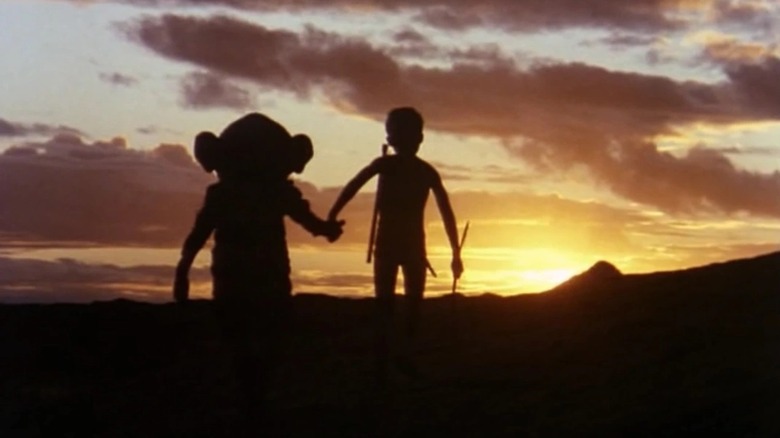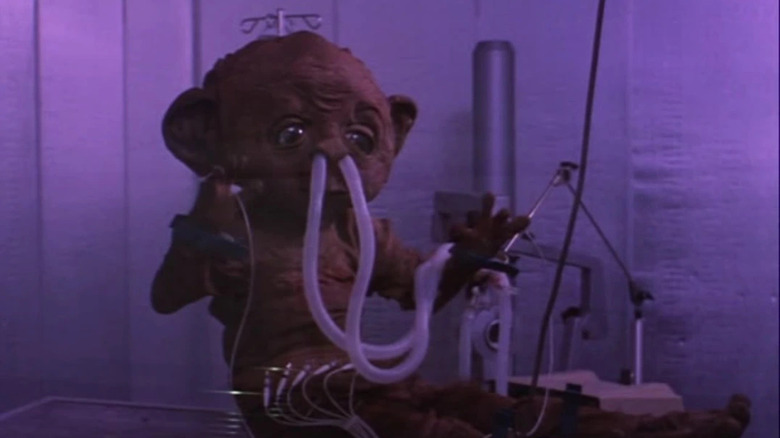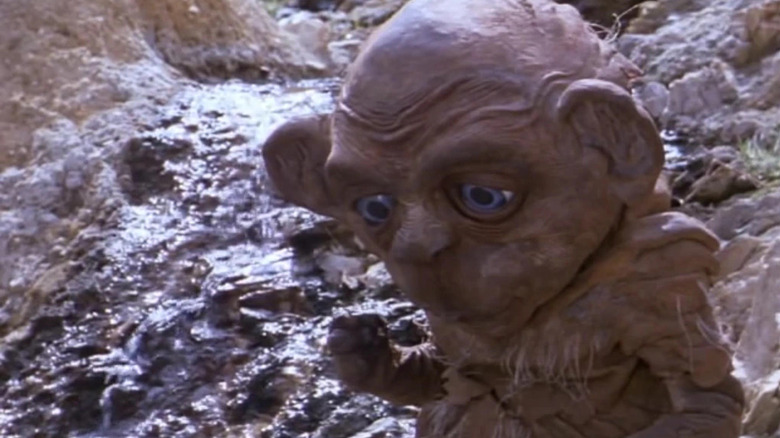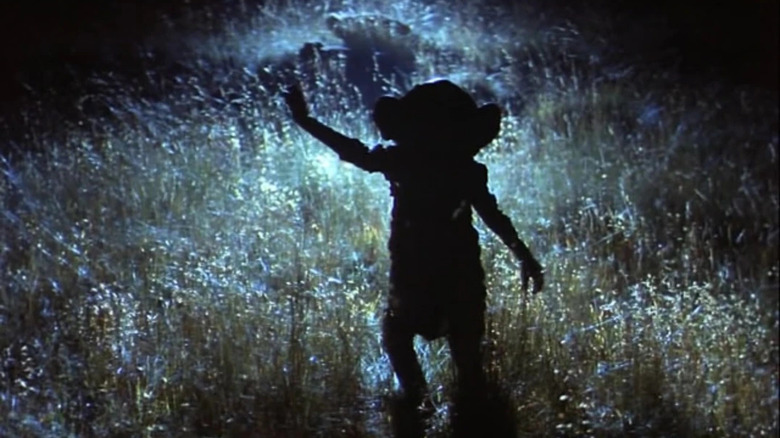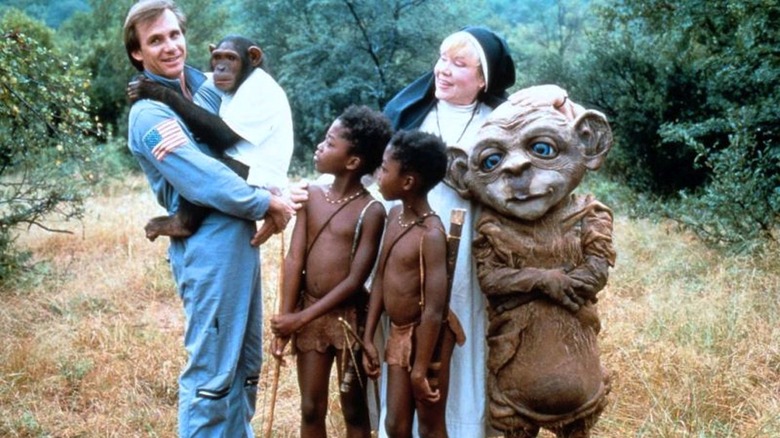The Nukie Controversy Explained: Destroying Crappy Movies For Charity
Sias Odendaal and Michael Pakleppa's 1987 film "Nukie" is only remarkable for how undeniably terrible it is. Very clearly riding on the coattails of Steven Spielberg's "E.T. the Extra-Terrestrial," "Nukie" follows the adventures of the titular space alien as it crash lands in the African savannah and befriends two young brothers named Tiko and Toki (Siphiwe Mlangeni and Sipho Mlangeni). Much of the film is devoted to reuniting Nukie with his alien compatriot Miko (both played by Anthony Morrison) who crash-landed in the United States, and who is being held in a high-security military facility. The two aliens can communicate telepathically, and they repeatedly scream each other's names, perhaps inspiring rowdier audience members to join in.
"Nukie" has appeared on lists of the worst movies ever made, and is a largely miserable experience. Steve Railsback from "The Stunt Man" and "Lifeforce" appears, as does Glynnis Johns from "Mary Poppins."
Fans of the Milwaukee-based production company Red Letter Media will likely be familiar with the existence of "Nukie." Red Letter Media came to YouTube prominence in the late '00s with an extended, ultra-detailed video review of George Lucas' "Star Wars: Episode I — The Phantom Menace" wherein their critic character — an elderly, crass serial killer named Harry S. Plinkett (Mike Stoklasa) — broke down every minor detail of the film and why they didn't work dramatically. Since then, Red Letter Media has released a long series of videos wherein they watch and talk about a random assemblage of ultra-obscure, terrible B-movies, looking for the slightest hints of entertainment value.
They call that particular show "Best of the Worst."
I did it all for the Nukie
Over the years, fans have mailed strange and terrible movies on VHS and DVD to Red Letter Media, and the company has amassed a sizeable collection. As time passed, VHS copies of "Nukie" in particular came flooding in more and more, until they accumulated over 100 copies.
Bear in mind that when Red Letter Media finds a movie they particularly hate, will make a show of its destruction. In their videos, they have dropped bowling balls onto VHS cassettes, set them on fire, or shot them with guns. Rather than affect the attitude of archivists, protecting B-movies for future generations, Red Letter Media seems to say that cinema is perhaps too cluttered with junk, and destroying a VHS cassette of terrible, lost movies is no big loss.
Recently, in a video titled "We Finally Watched Nukie: The VHS Grading Video," Stoklasa, Jay Bauman, and Rich Evans finally did the same for their entire collection of "Nukie" cassettes. The trio recently discovered that there is a sizable — and quite curious — phenomenon of vintage, still-wrapped VHS cassettes being graded by experts, and sold online for thousands of dollars each. The strangest part was that the films fetching the highest prices were well-known blockbusters that can easily be found on other formats elsewhere. "Ghostbusters" and "Jurassic Park" VHSs, for instance, could fetch upwards of $75,000.
Red Letter Media smelled a scam and decided to put a theory of theirs to the test.
What makes something valuable?
Bauman, Evans, and Stoklasa scoured their collection for the highest-quality, most popular VHS cassettes they could find and mailed them to a grading company that would return their cassettes sealed in plastic cases, and labeled with a number. It was similar to the quality grading systems that surround valuable comic books. For yuks, they also included the best-quality copy of "Nukie" they could find, still in its original shrinkwrapping. Because they were skeptical of the company's veracity, they also included a fake VHS, mocked up by an artist friend of theirs. To the grading company's credit, they spotted it as a fake. "Nukie" returned with an 8.5 "mint" grading.
Of course, the question arose: what makes something valuable? Why is a sealed VHS cassette of "Ghostbusters" worth thousands of dollars? An economist will tell you that an object is worth however much someone will pay for it. The people at Red Letter Media, who clearly place no monetary or sentimental value on their scads of VHS tapes, were baffled by the speculative VHS market and were keen to futz with the system a little bit. As such, they put their graded "Nukie" VHS on eBay, and, to increase its rarity, fed the rest of their collection into a wood chipper.
The sight of a hundred "Nukie" cassettes being obliterated is pretty exhilarating. It was a punk rock act of smashery that thumbed its nose at both the suspicious VHS speculation market, as well as any highfalutin notions that the sanctity of cinema should extend to protect trash like "Nukie." They pledged to donate any proceeds from their "Nukie" VHS entirely to charity. 50% would go to St. Jude's Children's Research Hospital, and 50% would go to the Wisconsin Human Society.
The cassette sold for $80,600.
The controversy
When the video of Red Letter Media destroying their "Nukie" collection was published, many people took to social media, incensed that physical media was being destroyed. A Twitter user called @ViceApologist was angry at Red Letter's cynicism when it came to manipulating markets, and a user named @SamHaft (in a now-deleted Tweet) likened the act to a book burning. Many feel that, in the age of streaming services, keeping any and all movies alive on physical media is an important act of archiving. Preservation must take precedence over amusing stunts, even if said stunt did raise a sizeable amount of money for charity. Destroying 100 VHS cassettes of "Nukie" was, it seems, a form of cultural vandalism. Keeping track of movies was hard enough without active acts of brazen destruction.
Anecdotally, some compatriots have expressed concern that the cynicism on display by Red Letter Media would inspire copycats who might actually destroy legitimately important or hard-to-find films. Additionally, some feared that a bitter attitude about archiving and the (low) value of movies would be perpetuated throughout the culture, leading to less attention being paid to film preservation than is already.
After the graded "Nukie" cassette sold, Bauman took to Twitter to defend their stunt, pointing out that 100 VHS copies of "Nukie" have little value. Bauman rightly points out that VHS is a terrible format when it comes to archiving films, given its flimsy materials and tendency to break down after a mere 25 years or so. The future of a film like "Nukie" was not being threatened by the cassette destruction, and, indeed, the film was easily found online. It was only a matter of time before 100 "Nukies" wound up in a landfill.
Nukie vs. book burning
Bauman also pointed out how foolish it was to compare the destruction of "Nukie" cassettes to an actual book burning, pointing out that the cultural context is perhaps quite a bit different. Book burnings are typically held as a form of mass censorship, and were used by fascist governments to prevent education and ideas from spreading. Red Letter Media was not censoring "Nukie." They were merely taking out a bag of plastic waste.
Indeed, one might argue that the destruction of "Nukie" is, in fact, better for the act of archiving at large. Think about how many VHS cassettes there still are in the world. Some may be rare, but the vast bulk of them, I'm willing to wager, are mere junk in an increasingly digitized world. How many VHS copies of "Titanic," for instance, does the world really need? Is having those VHS cassettes going to allow a popular film like "Titanic" to perpetuate, or has the medium's usefulness been supplanted? Would audiences have been upset if Red Letter Media destroyed 100 — or even 10,000 — VHS copies of "Shrek?" Sometimes, to de-clutter the shelves and streamline the archiving process, s*** needs to be thrown away.
I understand why people wince. I, too, was a collector of movies for many years. I have a sizeable personal collection of VHS cassettes, DVDs, and Blu-rays (I never had a Laserdisc or a Betamax player). For me personally, a lot of my VHS curios are very dear, and some might even be rare; do you own "The Playgirl Morning Workout?" But I also understand the need to cull the shelves every once in a while and surmise what still requires archiving, and what can be thrown away.
"Nukie" is fine. If you should need it.
